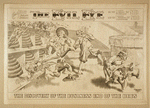"Over the weekend, while the Baby sleeps, the Mother and Husband sit together in the Tiny Tim Lounge. The Husband is restless and makes cafeteria and sundry runs, running errands for everyone. In his absence, the other parents regale her further with their sagas. Pediatric cancer and chemo stories: the children's amputations, blood poisoning, teeth flaking like shale, the learning delays and disabilities caused by chemo frying the young, budding brain. But strangely optimistic codas are tacked on---endings as stiff and loopy as carpenter's lace, crisp and empty as lettuce, reticulate as a net--ah, words. 'After all that business with the tutor, he's better now, and fitted with new incisors by my wife's cousin's husband, who did dental school in two and half years, if you can believe that. We hope for the best. We take things as they come. Life is hard.'
'Life's a big problem,' agrees the Mother....Together, the parents huddle all day in the Tiny Tim Lounge--no need to watch Oprah. They leave Oprah in the dust. Oprah has nothing on them. They chat matter-of-factly, then fall silent and watch Dune or Star Wars, in which there are bright and shiny robots, whom the Mother now sees not as robots at all but as human beings who have had terrible things happen to them."
---Lorrie Moore, "People Like That Are The Only People Here: Canonical Babbling in Peed Onk" in Birds of America (1998)
The title of Moore's story references a comment made by a friend of "The Mother " who is surprised by the "bromides" through which the parents in the ward narrate their experiences. I read that after the publication of the story, that some parents at a hospital near to Moore became upset, thinking that her critique was directed at them.
There is something about Moore's piece that seems to hover at the boundaries of fiction and non-fiction and that could lead an unknowing reader--one unfamiliar with Moore-- to misread her piece and its genre. I suspect though that these parents correctly surmise that Moore's intent is to expose the conventions of tales of illness (the mandate to "stay positive!" is fairly conventional these days) to reveal the lack of control that underpins such talk, such posturing. Yet she also shows that the parents' platitudes serve as important guideposts as they navigate through their harrowing journeys. For the Mother, who has not yet been fully inducted into this world, they can only seem horrifically discordant, part of the nauseous atmosphere of the ward.
Tuesday, June 22, 2010
Empty as Lettuce
Labels:
babies,
cancer,
childhood,
disease,
motherhood,
movies,
Oprah,
parenthood,
robots
Subscribe to:
Post Comments (Atom)






No comments:
Post a Comment